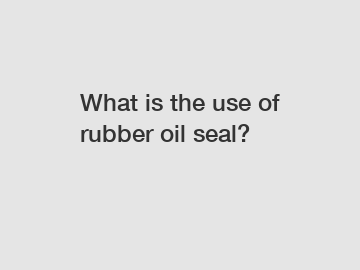What is the use of rubber oil seal?
Rubber oil seals play an important role in various industrial applications by preventing the leakage of oil and other fluids. These seals are designed to provide a barrier between two components to ensure the proper functioning and longevity of machinery and equipment. In this article, we will explore the use of rubber oil seals, their benefits, and the importance of using high-quality seals.
Preventing Oil Leakage.
-----------------------.

Rubber oil seals are primarily used to prevent oil or other fluids from leaking out of a system. They are commonly found in engines, gearboxes, and other rotating components where lubrication is crucial. By creating a tight seal between stationary and rotating parts, oil seals help maintain the required oil levels and prevent leaks that could lead to equipment failure or loss of efficiency.
Types of Rubber Oil Seals.
-------------------------.
There are several types of rubber oil seals available in the market, each with its own unique design and application. The most common types include lip seals, V-rings, mechanical face seals, and labyrinth seals. Lip seals are widely used due to their simple construction and effectiveness in preventing oil leakage. V-rings are commonly used in low-pressure applications, while mechanical face seals are suitable for heavy-duty machinery. Labyrinth seals offer excellent protection against contamination and are commonly used in industries with high dust or debris levels.
Benefits of Rubber Oil Seals.
----------------------------.
Rubber oil seals offer several benefits that make them ideal for industrial applications. One of the key advantages is their flexibility and ability to adapt to different operating conditions. They can withstand high temperatures, resist chemical corrosion, and remain functional in harsh environments. Rubber seals are also known for their low friction properties, reducing wear between moving parts and improving overall performance. Additionally, they are relatively easy to install and replace when required.
Importance of High-Quality Seals.
-------------------------------.
Using high-quality rubber oil seals is crucial to ensure the reliability and efficiency of machinery and equipment. Inferior or poorly designed seals may not provide the necessary sealing capability, leading to leaks, increased maintenance costs, and even catastrophic equipment failure. High-quality seals are designed to withstand extreme conditions, offer superior durability, and provide optimal protection against oil leaks and contamination. It is important to source seals from reputable manufacturers with expertise in seal design, materials, and manufacturing processes.
Maintaining and Replacing Seals.
-------------------------------.
Regular inspection and maintenance of rubber oil seals are essential to identify any signs of wear or damage. Over time, seals can become brittle, warped, or cracked, compromising their sealing effectiveness. In such cases, it is necessary to replace the oil seal with a new one. When replacing seals, it is important to choose the correct size and type of seal to ensure proper fit and function. Working with a knowledgeable supplier or manufacturer can help in selecting the right seal for specific applications.
Conclusion.
----------.
Rubber oil seals are indispensable components in various industrial applications, serving the important purpose of preventing oil leaks and ensuring the effective operation of machinery and equipment. Selecting high-quality seals is essential to ensure optimal performance, longevity, and reliability. Regular inspection and maintenance are key to identifying any issues and taking timely action. If you have any further questions or need assistance in selecting the right rubber oil seals for your application, please do not hesitate to contact us.
[Contact us] to learn more about our range of rubber oil seals and other sealing solutions.
If you want to learn more, please visit our website green tc rubber oil seal from china manufacturer, china seals material manufacturers, oil seal number meaning.
200
0
0

Comments
All Comments (0)